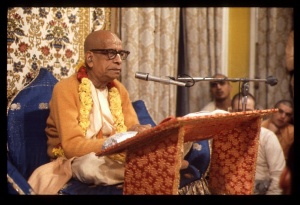BG 8.15: Difference between revisions
m (1 revision(s)) |
(Vanibot #0054 edit - transform synonyms into clickable links, which search similar occurrences) |
||
| (One intermediate revision by one other user not shown) | |||
| Line 1: | Line 1: | ||
{{ | [[Category:Bhagavad-gita As It Is (1983+) - Chapter 08]] | ||
<div style="float:left">'''[[Bhagavad-gita As It Is (1983+)]] - [[BG 8 (1983+)|Chapter 8: Attaining the Supreme]]'''</div> | |||
<div style="float:right">[[File:Go-previous.png|link=BG 8.14]] '''[[BG 8.14]] - [[BG 8.16]]''' [[File:Go-next.png|link=BG 8.16]]</div> | |||
{{CompareVersions|BG|8.15|BG 1972|BG 1983+}} | |||
{{RandomImage}} | |||
==== TEXT 15 ==== | ==== TEXT 15 ==== | ||
<div class="devanagari"> | |||
:मामुपेत्य पुनर्जन्म दुःखालयमशाश्वतम् । | |||
:नाप्नुवन्ति महात्मानः संसिद्धिं परमां गताः ॥१५॥ | |||
</div> | |||
<div | <div class="verse"> | ||
:mām upetya punar janma | |||
:duḥkhālayam aśāśvatam | |||
:nāpnuvanti mahātmānaḥ | |||
:saṁsiddhiṁ paramāṁ gatāḥ | |||
</div> | </div> | ||
==== SYNONYMS ==== | ==== SYNONYMS ==== | ||
<div class="synonyms"> | |||
<div | ''[//vanipedia.org/wiki/Special:VaniSearch?s=mām&tab=syno_o&ds=1 mām]'' — Me; ''[//vanipedia.org/wiki/Special:VaniSearch?s=upetya&tab=syno_o&ds=1 upetya]'' — achieving; ''[//vanipedia.org/wiki/Special:VaniSearch?s=punaḥ&tab=syno_o&ds=1 punaḥ]'' — again; ''[//vanipedia.org/wiki/Special:VaniSearch?s=janma&tab=syno_o&ds=1 janma]'' — birth; ''[//vanipedia.org/wiki/Special:VaniSearch?s=duḥkha&tab=syno_o&ds=1 duḥkha]-[//vanipedia.org/wiki/Special:VaniSearch?s=ālayam&tab=syno_o&ds=1 ālayam]'' — place of miseries; ''[//vanipedia.org/wiki/Special:VaniSearch?s=aśāśvatam&tab=syno_o&ds=1 aśāśvatam]'' — temporary; ''[//vanipedia.org/wiki/Special:VaniSearch?s=na&tab=syno_o&ds=1 na]'' — never; ''[//vanipedia.org/wiki/Special:VaniSearch?s=āpnuvanti&tab=syno_o&ds=1 āpnuvanti]'' — attain; ''[//vanipedia.org/wiki/Special:VaniSearch?s=mahā&tab=syno_o&ds=1 mahā]-[//vanipedia.org/wiki/Special:VaniSearch?s=ātmānaḥ&tab=syno_o&ds=1 ātmānaḥ]'' — the great souls; ''[//vanipedia.org/wiki/Special:VaniSearch?s=saṁsiddhim&tab=syno_o&ds=1 saṁsiddhim]'' — perfection; ''[//vanipedia.org/wiki/Special:VaniSearch?s=paramām&tab=syno_o&ds=1 paramām]'' — ultimate; ''[//vanipedia.org/wiki/Special:VaniSearch?s=gatāḥ&tab=syno_o&ds=1 gatāḥ]'' — having achieved. | ||
</div> | </div> | ||
==== TRANSLATION ==== | ==== TRANSLATION ==== | ||
<div class="translation"> | |||
<div | |||
After attaining Me, the great souls, who are yogīs in devotion, never return to this temporary world, which is full of miseries, because they have attained the highest perfection. | After attaining Me, the great souls, who are yogīs in devotion, never return to this temporary world, which is full of miseries, because they have attained the highest perfection. | ||
</div> | </div> | ||
==== PURPORT ==== | |||
= | <div class="purport"> | ||
Since this temporary material world is full of the miseries of birth, old age, disease and death, naturally he who achieves the highest perfection and attains the supreme planet, Kṛṣṇaloka, Goloka Vṛndāvana, does not wish to return. The supreme planet is described in Vedic literature as ''avyakta'' and ''akṣara'' and ''paramā gati;'' in other words, that planet is beyond our material vision, and it is inexplicable, but it is the highest goal, the destination for the ''mahātmās'' (great souls). The ''mahātmās'' receive transcendental messages from the realized devotees and thus gradually develop devotional service in Kṛṣṇa consciousness and become so absorbed in transcendental service that they no longer desire elevation to any of the material planets, nor do they even want to be transferred to any spiritual planet. They only want Kṛṣṇa and Kṛṣṇa's association, and nothing else. That is the highest perfection of life. This verse specifically mentions the personalist devotees of the Supreme Lord, Kṛṣṇa. These devotees in Kṛṣṇa consciousness achieve the highest perfection of life. In other words, they are the supreme souls. | |||
</div> | |||
<div | <div style="float:right; clear:both;">[[File:Go-previous.png|link=BG 8.14]] '''[[BG 8.14]] - [[BG 8.16]]''' [[File:Go-next.png|link=BG 8.16]]</div> | ||
__NOTOC__ | |||
</div> | __NOEDITSECTION__ | ||
__NOTOC__ | |||
Latest revision as of 15:32, 17 February 2024

A.C. Bhaktivedanta Swami Prabhupada
TEXT 15
- मामुपेत्य पुनर्जन्म दुःखालयमशाश्वतम् ।
- नाप्नुवन्ति महात्मानः संसिद्धिं परमां गताः ॥१५॥
- mām upetya punar janma
- duḥkhālayam aśāśvatam
- nāpnuvanti mahātmānaḥ
- saṁsiddhiṁ paramāṁ gatāḥ
SYNONYMS
mām — Me; upetya — achieving; punaḥ — again; janma — birth; duḥkha-ālayam — place of miseries; aśāśvatam — temporary; na — never; āpnuvanti — attain; mahā-ātmānaḥ — the great souls; saṁsiddhim — perfection; paramām — ultimate; gatāḥ — having achieved.
TRANSLATION
After attaining Me, the great souls, who are yogīs in devotion, never return to this temporary world, which is full of miseries, because they have attained the highest perfection.
PURPORT
Since this temporary material world is full of the miseries of birth, old age, disease and death, naturally he who achieves the highest perfection and attains the supreme planet, Kṛṣṇaloka, Goloka Vṛndāvana, does not wish to return. The supreme planet is described in Vedic literature as avyakta and akṣara and paramā gati; in other words, that planet is beyond our material vision, and it is inexplicable, but it is the highest goal, the destination for the mahātmās (great souls). The mahātmās receive transcendental messages from the realized devotees and thus gradually develop devotional service in Kṛṣṇa consciousness and become so absorbed in transcendental service that they no longer desire elevation to any of the material planets, nor do they even want to be transferred to any spiritual planet. They only want Kṛṣṇa and Kṛṣṇa's association, and nothing else. That is the highest perfection of life. This verse specifically mentions the personalist devotees of the Supreme Lord, Kṛṣṇa. These devotees in Kṛṣṇa consciousness achieve the highest perfection of life. In other words, they are the supreme souls.